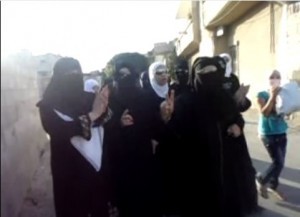A Mother Bereaved in Mouaddamiyya

Um Nasser is just one of the innumerable women in Syria struck down by tragedy. The 74-year-old widow, from the town of Mouaddamiyya outside Damascus, had four sons and two daughters. But two sons are now dead, and the other two are under arrest.
She welcomed me into her living room furnished with cushions in her home, a typical rural house made of clay and wood, with several rooms and a courtyard.
Wearing a loose traditional dress and a headscarf, Um Nasser dragged herself over to sit in front of me. She looked sad and deflated.
When I asked her about what had happened to her children, she started talking about her eldest son, 30-year-old Nasser. A construction worker, he was married with two boys, one aged five and the other two-and-half.

After he was arrested during a security raid in June 2011, Nasser spent five months in the prison at Al-Mazzeh military air base, and two months at the Adra Central Prison.
“It drove me mad that I’d lost him,” Um Nasser said. When he was released at the beginning of January 2012, she was delighted that he had come out of jail alive.
But her joy lasted only for 15 days.
“On January 27, at two the morning, security forces broke into our house and shot Nasser in the head. It pains me immensely every time I think of him dying in front of his children, his wife and me,” she said.
I asked Um Nasser why the security forces would kill Nasser after they had released him. She seemed confused, but said the main reason was probably that he was a former detainee and brother to another of her sons, Khalil, who was also in detention.
After fate struck this blow, there was more to come. Um Nasser’s 29-year-old son Ahmed was killed when Syrian security forces raided Mouddamiyya at the end of July. Ahmed wanted to escape with his family, but as Um Nasser put it, death had the last word that night.
Ahmed was married with a six-year-old son and five-year-old daughter; his wife is pregnant.
As the family took some belongings and made to leave the house, a snipers positioned on a nearby rooftop shot Ahmed in the lower abdomen.
“We couldn’t do anything to help him,” his mother said.
My questioning seemed to make Um Nasser’s grief worse as she recounted more details of her sons’ deaths.
Then she turned to her third son Khalil, 26, who is still under arrest at Al-Mazzeh.
“Last year, a few months after the start of the revolution, the security forces entered Mouaddamiyya under the pretext of searching for armed gangs, even though the Free Syrian Army wasn’t yet in the town,” Um Nasser said. “They came into our grocery store, where Khalil was. At 1:30 in the afternoon, a young neighbour of ours knocked at the door and told me Khalil had been arrested. I rushed to the shop with my son Ahmed and his wife, and found the security forces still there.
“When I asked about my son, one of them told us to go away. We stopped a neighbour to ask what had happened and he told us that the security forces had arrested Khalil. We went back to the store and I begged them to tell me why they had done so, but they didn’t say a word.”
She continued, “Khalil was held for four months and we had no news of him. He was then released for two weeks, but re-arrested the day after Nasser was killed. I still don’t know whether he’s alive or dead. I just want the truth.”
Um Nasser spoke about 24-year-old Maher, her youngest son who has also been arrested.
Maher joined the Free Syrian Army as a volunteer in July. When a bomb went off in his hand during training, two other fighters took him to hospital, but they were stopped at a checkpoint and arrested.
“Now he’s gone from my sight, too,” Um Nasser said.
Um Nasser is struggling to make ends meet, especially since Khalil was arrested and the family’s grocery store shut down. She inherited the shop from her husband, who died four years ago, but is too old to run it herself, and conservative tradition prevents her daughters or daughters-in-law working there. She now lives on hand-outs from relatives and neighbours.
Um Nasser only has her two daughters. One is married and the other, 23, lives with her. Ahmed’s wife and their children also live with her. Each suffers their own form of grief – the pain of a wife who has lost her husband differs from that of a mother who has lost two sons.
The only things Um Nasser has left are faith and patience. She wishes to see her son’s murderers punished, and longs for the safe return of Maher and Khalil.
“Perhaps they will make up for the loss of Nasser and Ahmed,” she said. “I am now the mother of two martyrs and two detainees, and I may yet be mother to four martyrs.”
